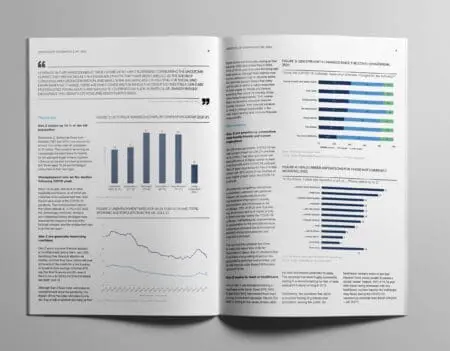Do you want strategic insight into your global sustainability messaging?
The much-anticipated Global Outlook on Sustainability: A Consumer Study 2024-25 is now available to order. Covering 10,000 respondents from 10 leading economies, this report gives insights and inspiration on how best to position and prioritise your brands’ products.
Download the executive summary for a detailed overview or order the Global Sustainability Report today.
Travel industry outlook
The outbreak of the COVID-19 pandemic nearly decimated the international holiday market, with travel restrictions and quarantine requirements in place for the best part of two years. In March 2022, the UK government announced the removal of all international travel restrictions, leading to a spike in holiday bookings. This sudden jump in demand led to widespread disruption causing frustrations for both consumers and businesses.
Fast-forward to 2023, and the international travel market is still experiencing a post-pandemic resurgence. Many travellers remain eager to make up for lost time and head away on international trips – a phenomenon labelled by the media as ‘revenge travel’. With travellers reporting more positive experiences at UK borders following the disruption and chaos of 2022, this has encouraged more travellers to seek overseas adventures, many for the first time since before the pandemic.
Cost of living crisis boosts staycations
Despite many travellers being eager to head abroad, some have seen their plans derailed by the cost of living crisis. Inflation reached an all-time high in October 2022, causing household budgets and disposable incomes to be squeezed, particularly for those with the lowest household incomes. This has had a significant impact on the holiday market, with nearly eight out of ten consumers saying that the cost of holidays has the biggest impact on their travel planning. As a result, many households will continue to choose staycations against the backdrop of rising holiday prices and inflationary pressures, which will see the domestic holiday market remain buoyant during this period of economic downturn.
Impact of sustainability on the travel industry
The return of international travel undeniably has many benefits for businesses around the world, but this success is met with the ever-pressing and concerning issue of global warming. Activists continue to warn of increased global temperatures, leading to rising sea levels and the increasing frequency and intensity of natural disasters. Indeed, the widely reported lack of snow caused extensive challenges throughout European ski resorts last winter, and during the summer of 2020 temperatures in the UK surpassed 40º Celsius – the highest figure ever recorded. However, travel brands are well placed to provide and incorporate sustainable initiatives to encourage consumers to become more sustainable travellers and global citizens.

Warm winter last year forced closure of ski resorts throughout Europe. Source: The Guardian
Three sustainability-focused strategies for travel brands to follow
There are many avenues travel brands can take to encourage consumers to travel more sustainably. Additionally, with three-quarters of consumers perceiving sustainable holidays to be more expensive than other types of holidays, travel brands should keep cost-conscious travellers front of mind when promoting sustainable travel options.
1. Encouraging use of public transport
Public transport options are often easily accessible and more affordable than other methods of transport when travelling – particularly in urban areas. Using transport options such as trains and buses helps to reduce carbon emissions and reduces the number of vehicles on the road, which in turn helps to improve air quality. Multiple countries and cities are focusing on promoting low-cost public transport, such as the German government offering a €9 monthly travel ticket across the country between June and August 2022, and the Spanish government offering free rail travel on short and medium journeys between September and December 2022.

Increased rail usage during the period in which the 9-euro ticket was offered contributed to climate protection. Source: Deutsche Bahn
2. Promoting ‘undertouristed’ destinations
Destinations such as Venice and Barcelona have long been victims of over-tourism, leading to clashes between locals and tourists on multiple occasions, and officials implementing various policies to try and reduce the number of visitors during peak season. Brands can instead promote ‘undertouristed’ destinations to encourage a harmonious balance between tourists, the local community and the natural environment. For example, the Italian Ministry of Tourism launched a campaign to promote hidden gem destinations within the country, with more than 1,000 unique settlements, 100 landscapes and 100 walking routes being part of the campaign, which also promotes slow tourism practices such as cycling, sailing and hiking.
3. Showcasing sustainable accomodation options
Travel brands can tap into the sustainable accommodation sector by promoting a range of differing cost options. For example, for more cost-conscious travellers, hostels and other shared accommodations can be a popular sustainable option, whereas those looking to spend more on accommodation may look at eco-accredited hotels and resorts. easyJet Holidays and Jet2 are among the operators promoting more sustainable choices for consumers, by unveiling ‘sustainable holiday’ tabs in which travellers can browse through a range of different hotel options, all of which are accredited by the Global Sustainable Tourism Council (GSTC). At the luxury end of the scale, travellers can opt for high-end luxury eco-resorts such as Bucuti & Tara Beach Resort in Aruba. This is the Caribbean’s first and only carbon-neutral resort, and offers a variety of top-end suites including a Penthouse Suite for $8,512 per week*. The resort also focuses on implementing sustainable initiatives such as employing local suppliers, using solar panels to heat water for guest rooms and laundry services, as well as carrying out monthly beach clean-ups with guests and employees. This resort is a successful example of how brands can amalgamate quality and premium offerings with sustainability.

Bucuti & Tara Beach Resort in Aruba uses solar panels to heat water for guests rooms and laundry services. Source: Bucuti & Tara Beach Resort
Consumer attitudes towards sustainable travel
A majority of consumers perceive travel companies to be guilty of greenwashing, and so gaining trust amongst consumers and showcasing sustainability credentials will be essential for travel brands moving forward. Fortunately, there are a host of initiatives brands can adopt to become more trusted amongst consumers. Primarily, they need to be transparent about sustainability objectives, initiatives and results. Consumer trust will deepen if they are updated with a company’s progress on its sustainability journey. Examples of successful initiatives and tangible roadmaps for the future will further deepen trust amongst consumers.
Mintel’s data shows that travellers are keen to see a range of sustainability projects supported by travel companies in order to be deemed a truly sustainable brand. For example, protecting the local environment, reducing packaging waste and protecting the local community all score highly amongst consumers when considering which are the most important projects to support. Evidence of the successes and improvements to be made to these projects will also be welcomed by consumers and in turn will lead to improved trust levels.
Gen Z become increasingly important for travel brands
Brands are increasingly focusing on Generation Z’s perspectives as this group of consumers now accounts for 15% of the UK population. Therefore, they are an increasingly important group for brands to understand and target as their spending power grows year-on-year and they become independent adults, and consumers, in their own right. Gen Z’s approach to sustainable travel is to seemingly adopt a more hands-on approach. Popular sustainable activities include nature-based activities, tours with local guides and volunteering. Whilst Gen Zs are typically less affluent than their older counterparts, they are eager to get involved with sustainable initiatives and engage with a local community whilst on their travels. As globally-connected consumers who have grown up during an era of heightened environmental awareness, many young Brits will remain conscious of incorporating hands-on sustainability initiatives into their travel plans in the future.
What we think
It is imperative for travel brands to step up and take accountability for their environmental impact, particularly as issues surrounding sustainability permeate into every aspect of daily lives. Moving forward, consumers will increasingly expect to see sustainable tourism practices being implemented, along with complete transparency from travel brands on their sustainability credentials. Consumers will also increasingly rely on travel brands to be guided in their holiday choices, in order to become more eco-conscious travellers – particularly as other factors such as cost and quality remain at the forefront of consumers’ minds.
*the advertised price for 8-15 July 2024































